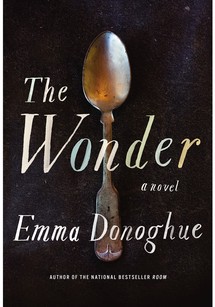Emma Donoghue burst onto the wider literary scene with
Room, a sort-of thriller that unfolds chillingly as the reader comes to understand the grim restrictions of the narrator's life. Like that earlier novel, which became an Oscar-nominated film,
The Wonder explores a dark, insular, and rigidly controlled environment. This time, though, it's one driven by a belief system rather than a sociopath.
The Wonder takes place in 19th-century Ireland in a remote farming community. Apparently, a miracle is taking place: For four months, a young Catholic girl, Anna O'Donnell, has been living on air and a few spoonfuls of water. An English Protestant nurse, Lib Wright, rigorously trained by Florence Nightingale, is brought in by a self-appointed committee to observe the child, or to determine whether a fraud is being perpetrated. Donoghue's clever use of an outsider as narrator lets her explain anomalies to us—what a creepie is (a log stool) and why people tie rags to a tree (to hold their pain)—as she encounters them herself. But there is more to this mystery than superstitions and local dialect. Lib must decipher the private truths of Anna and her family, who have closed ranks in grief over the loss of a son. She must puzzle out the community itself and its contradictory beliefs in religion, science, and tradition. And Lib has her own sorrowful secrets, her own need for personal redemption. Donoghue deftly pairs the two stories, and as Lib uncovers the truth about Anna, she gradually owns the truth about herself.


